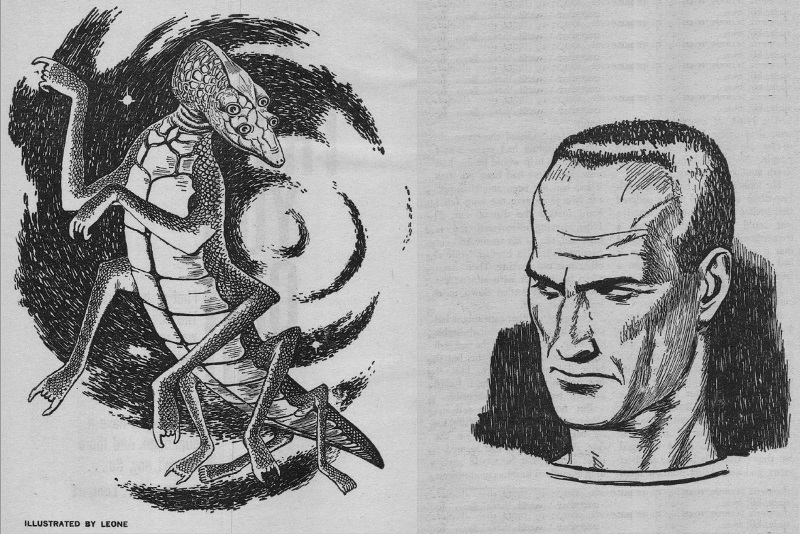
by Gideon Marcus
Science fiction magazines are not created equal.
Every editor brings her/his own slant to their magazine's theme. For instance, Cele Goldsmith strikes an old-fashioned chord, reviving classics from the Pulp Era in Amazing and Fantastic. Fred Pohl keeps things reliable (if not exceptional) in Galaxy, but showcases new and innovative works in IF. Before it went under, Fantastic Universe devoted much ink to flying saucer stories and articles.

And as you will soon see, Analog is preoccupied with psychic powers and pseudo-scientific quackery (a redundant phrase?). Viz, the May 1962 issue:
Anything You Can Do! (Part 1 of 2), by Darrell T. Langart
As you might have guessed, Mr. "Langart"'s name is really an anagram for Analog perennial, Randall Garrett (this is another way magazines are differentiated – they each have a stable of regular authors). Generally, when Garrett uses a pseudonym, it means he's got another piece in the magazine; more on that later.
Anything is a surprisingly (for Garrett) capable story about a single alien invader, and the man who is recruited and intensively trained to stop the extraterrestrial's acts of violence and theft. It's the second time one of his stories has featured gifted identical twins, one of whom has a disability which turns out to be an asset (see The Foreign Hand-Tie. It is also a story that very well could take place in the same universe as the recent "Ship Named MacGuire" series. So far, it's shaping up to be a good short novel. Four stars.

The Next Logical Step, by Ben Bova
Recent author Ben Bova (who prefers to describe a genius as "a regular Galileo" rather than "a regular Einstein") hasn't turned in anything particularly impressive to date. Step is about a military wargaming computer that delivers a full-sensory experience, one that almost inevitably depicts even small brushfire wars ending in global conflagration. Simulated Mutually Assured Destruction. Nice concept, but heavy handed and perfunctorily executed. Two stars.

Nor Iron Bars a Cage…, by Johnathan Blake MacKenzie
I'm not sure that this piece of crime fiction, in which an American and British team of detectives track down a child molester, really belongs here. It starts promisingly enough, but then just sort of degenerates into mediocrity, particularly the eight pages of psychological exposition at the end. I also did not appreciate the lumping of child rapists and gay people – according to the recent eye-opening television special on homosexuals, The Rejected, perhaps as much as 40% of the population is queer to some degree, and all of them are human beings with a normal distribution of traits (negative and positive). Two stars.

By the way, I'm pretty sure Mr. "MacKenzie" is Randall Garrett in disguise. The story has his fingerprints on it, and he's already appeared pseudonymously earlier in the issue.
The Fourth Law of Motion, by Dr. William O. Davis
Editor Campbell is always trying to prove that the "Dean Drive," a purportedly reactionless engine that would overturn the laws of physics as we know them, is a legitimate invention. To that end, he's enlisted the aid of a Dr. Davis, the head of a Connecticut paper company. At first, I dismissed the article as hot air, but I think it does make some interesting points (even if they probably don't support the efficacy of Dean's Drive).
Davis suggests that Newton's famous equation, F=ma, needs to be modified to reflect that, when an object is accelerated, it doesn't do so all at once. The force pushes on the object's nearest components first, and the impact then ripples along the object in a wave until the whole thing is in motion. Basically, physical bodies can respond to forces "out of phase" with each other. This is not a revolutionary concept – there's even a name for it: "starting transient."
That this jerk or change in acceleration could have other effects is interesting, and I'd like to know more about them. But my college training was in physics. For the rest of you, I suspect this dry explication on the third derivative of position will be must-skip material. Two stars.

Sight Gag, by Larry M. Harris
Mr. Harris is really Laurence M. Janifer, who is not only a regular at Analog, but frequently writes in collaboration with Mr. Garrett. I've liked some of his stuff very much, but this gimmick story about a vengeful fellow who goes after a psionic G-Man reads like something out of the early 50s. Three stars, since it's decently told. No more, because of the hoary format.

Look Before You Leap, by Donald E. Westlake
This one opens so well, with a terrified Air Force boot teleporting from a particularly harrowing episode of Basic Training and then, in equal fright, zapping right back. He is the latest result (victim) of a controlled stress test conducted by a certain Colonel. The officer's goal is to sieve out the psionically gifted by monitoring the most difficult situation a human can face this side of the battlefield.
Sadly, by about halfway through, the story ends up twice as padded as it needs to be, and the compounding of indignity and torture upon the recruit in an attempt to make him duplicate his initial feat is both unpleasant and unrealistically shrugged off at the story's end. Two stars.

***
2.6 stars and a grinding slog. I feel like I've just spent a week in Basic. Well, there's always next month…
